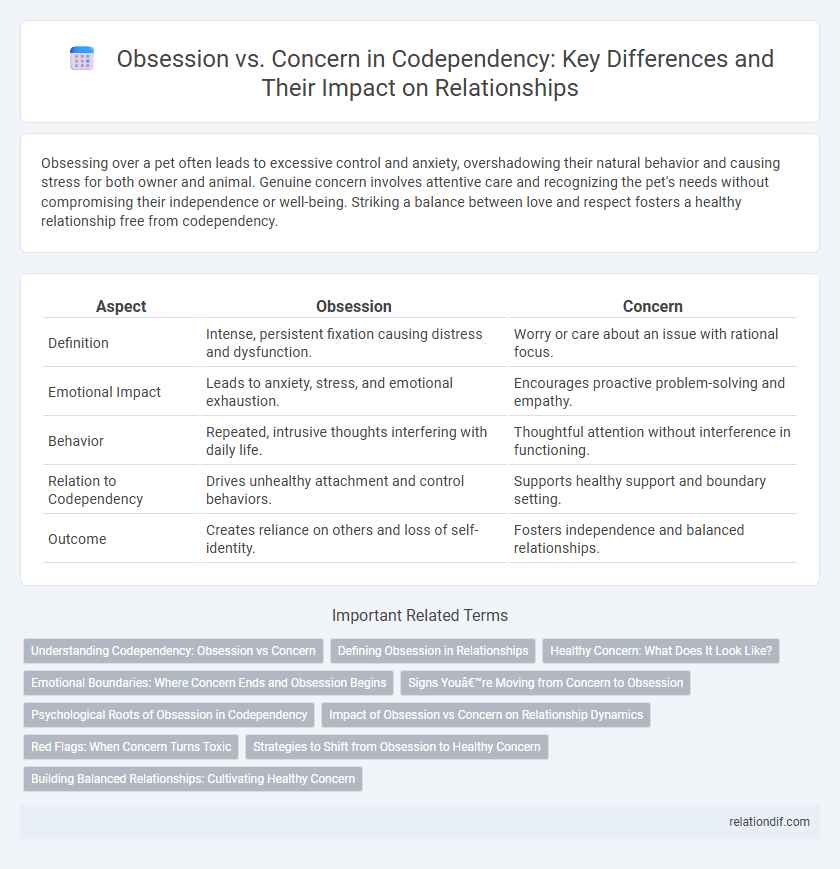Obsessing over a pet often leads to excessive control and anxiety, overshadowing their natural behavior and causing stress for both owner and animal. Genuine concern involves attentive care and recognizing the pet's needs without compromising their independence or well-being. Striking a balance between love and respect fosters a healthy relationship free from codependency.
Table of Comparison
| Aspect | Obsession | Concern |
|---|---|---|
| Definition | Intense, persistent fixation causing distress and dysfunction. | Worry or care about an issue with rational focus. |
| Emotional Impact | Leads to anxiety, stress, and emotional exhaustion. | Encourages proactive problem-solving and empathy. |
| Behavior | Repeated, intrusive thoughts interfering with daily life. | Thoughtful attention without interference in functioning. |
| Relation to Codependency | Drives unhealthy attachment and control behaviors. | Supports healthy support and boundary setting. |
| Outcome | Creates reliance on others and loss of self-identity. | Fosters independence and balanced relationships. |
Understanding Codependency: Obsession vs Concern
Understanding codependency involves distinguishing obsession from genuine concern, as obsession is characterized by excessive fixation on another person's behaviors and emotions, often leading to loss of self-identity. Concern reflects healthy empathy and support without compromising personal boundaries or emotional well-being. Recognizing these differences is crucial for breaking codependent patterns and fostering balanced relationships.
Defining Obsession in Relationships
Obsession in relationships manifests as an overwhelming preoccupation with a partner's actions or feelings, often leading to loss of personal boundaries and emotional autonomy. It is characterized by persistent intrusive thoughts and compulsive behaviors aimed at controlling or monitoring the partner, differentiating it sharply from healthy concern. This fixation disrupts trust and mutual respect, fostering dependency rather than supportive interdependence.
Healthy Concern: What Does It Look Like?
Healthy concern involves caring deeply about someone's well-being while maintaining personal boundaries and emotional independence. It supports open communication, respect for individual choices, and balanced support without enabling dependency. Unlike obsession, healthy concern fosters mutual trust and promotes growth within relationships.
Emotional Boundaries: Where Concern Ends and Obsession Begins
Emotional boundaries are crucial in distinguishing healthy concern from unhealthy obsession in codependency, where concern respects personal limits and supports independence. Obsession breaches these boundaries by fostering excessive emotional involvement, control, and neglect of one's own needs. Recognizing signs such as persistent intrusive thoughts, inability to detach emotionally, and prioritizing another's issues over self-care helps identify when concern becomes detrimental obsession.
Signs You’re Moving from Concern to Obsession
Constantly replaying thoughts about a person's behavior or well-being signals a shift from healthy concern to obsession. When caring transforms into intrusive monitoring or excessive emotional distress over minor issues, it indicates codependent tendencies. Recognizing patterns such as neglecting personal boundaries or sacrificing self-care for others helps identify this change early.
Psychological Roots of Obsession in Codependency
Obsession in codependency stems from deep-seated psychological insecurities and unresolved attachment issues, leading to an overwhelming need for control and approval. Unlike healthy concern, which involves balanced empathy and support, obsession manifests as intrusive thoughts and compulsive behaviors centered on another person's actions. These patterns often originate from childhood emotional neglect or trauma, fueling a persistent fear of abandonment and low self-worth that drive obsessive tendencies.
Impact of Obsession vs Concern on Relationship Dynamics
Obsession in relationships often leads to controlling behaviors and emotional exhaustion, deteriorating trust and communication between partners. Concern fosters empathy and support, promoting healthier interactions and mutual respect. Understanding the distinction between obsession and concern is crucial for maintaining balanced relationship dynamics and emotional well-being.
Red Flags: When Concern Turns Toxic
Obsession differs from concern when focus becomes controlling, persistent, and emotionally draining, marking a red flag in codependent relationships. Healthy concern involves empathy and support, whereas obsession triggers anxiety, possessiveness, and limits personal boundaries. Recognizing these toxic patterns early helps prevent emotional harm and fosters balanced, respectful connections.
Strategies to Shift from Obsession to Healthy Concern
Shifting from obsession to healthy concern involves recognizing and challenging obsessive thoughts through mindfulness and cognitive-behavioral techniques. Establishing clear boundaries and practicing self-care routines redirect focus toward balanced emotional engagement rather than fixation. Utilizing support groups and therapeutic interventions fosters awareness, encouraging a shift from intrusive rumination to constructive concern.
Building Balanced Relationships: Cultivating Healthy Concern
Building balanced relationships requires distinguishing healthy concern from obsessive behaviors that undermine trust and autonomy. Healthy concern involves attentive listening, respectful boundaries, and genuine empathy without losing personal identity or control. Prioritizing clear communication and self-awareness fosters mutual support while preventing codependent patterns rooted in obsession.
Obsession vs Concern Infographic

 relationdif.com
relationdif.com